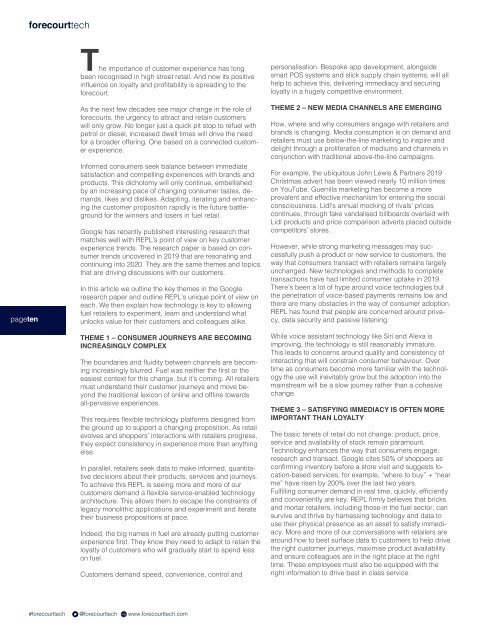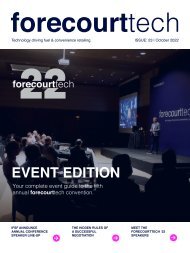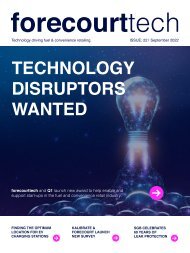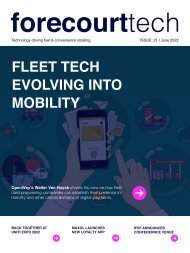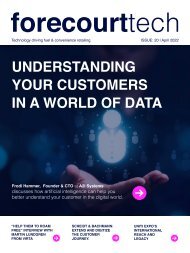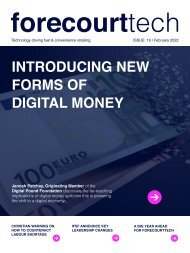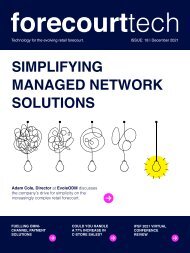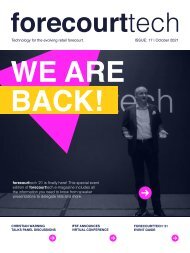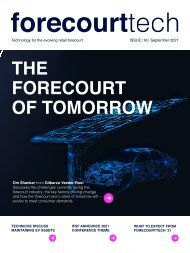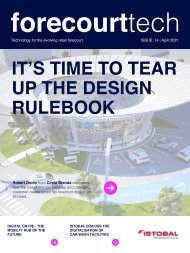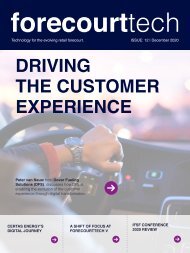forecourttech April 2020
A bi-monthly technology magazine for the evolving retail forecourt.
A bi-monthly technology magazine for the evolving retail forecourt.
- No tags were found...
Create successful ePaper yourself
Turn your PDF publications into a flip-book with our unique Google optimized e-Paper software.
<strong>forecourttech</strong><br />
pageten<br />
The importance of customer experience has long<br />
been recognised in high street retail. And now its positive<br />
influence on loyalty and profitability is spreading to the<br />
forecourt.<br />
As the next few decades see major change in the role of<br />
forecourts, the urgency to attract and retain customers<br />
will only grow. No longer just a quick pit stop to refuel with<br />
petrol or diesel, increased dwell times will drive the need<br />
for a broader offering. One based on a connected customer<br />
experience.<br />
Informed consumers seek balance between immediate<br />
satisfaction and compelling experiences with brands and<br />
products. This dichotomy will only continue, embellished<br />
by an increasing pace of changing consumer tastes, demands,<br />
likes and dislikes. Adapting, iterating and enhancing<br />
the customer proposition rapidly is the future battleground<br />
for the winners and losers in fuel retail.<br />
Google has recently published interesting research that<br />
matches well with REPL’s point of view on key customer<br />
experience trends. The research paper is based on consumer<br />
trends uncovered in 2019 that are resonating and<br />
continuing into <strong>2020</strong>. They are the same themes and topics<br />
that are driving discussions with our customers.<br />
In this article we outline the key themes in the Google<br />
research paper and outline REPL’s unique point of view on<br />
each. We then explain how technology is key to allowing<br />
fuel retailers to experiment, learn and understand what<br />
unlocks value for their customers and colleagues alike.<br />
THEME 1 – CONSUMER JOURNEYS ARE BECOMING<br />
INCREASINGLY COMPLEX<br />
The boundaries and fluidity between channels are becoming<br />
increasingly blurred. Fuel was neither the first or the<br />
easiest context for this change, but it’s coming. All retailers<br />
must understand their customer journeys and move beyond<br />
the traditional lexicon of online and offline towards<br />
all-pervasive experiences.<br />
This requires flexible technology platforms designed from<br />
the ground up to support a changing proposition. As retail<br />
evolves and shoppers’ interactions with retailers progress,<br />
they expect consistency in experience more than anything<br />
else.<br />
In parallel, retailers seek data to make informed, quantitative<br />
decisions about their products, services and journeys.<br />
To achieve this REPL is seeing more and more of our<br />
customers demand a flexible service-enabled technology<br />
architecture. This allows them to escape the constraints of<br />
legacy monolithic applications and experiment and iterate<br />
their business propositions at pace.<br />
Indeed, the big names in fuel are already putting customer<br />
experience first. They know they need to adapt to retain the<br />
loyalty of customers who will gradually start to spend less<br />
on fuel.<br />
Customers demand speed, convenience, control and<br />
personalisation. Bespoke app development, alongside<br />
smart POS systems and slick supply chain systems, will all<br />
help to achieve this, delivering immediacy and securing<br />
loyalty in a hugely competitive environment.<br />
THEME 2 – NEW MEDIA CHANNELS ARE EMERGING<br />
How, where and why consumers engage with retailers and<br />
brands is changing. Media consumption is on demand and<br />
retailers must use below-the-line marketing to inspire and<br />
delight through a proliferation of mediums and channels in<br />
conjunction with traditional above-the-line campaigns.<br />
For example, the ubiquitous John Lewis & Partners 2019<br />
Christmas advert has been viewed nearly 10 million times<br />
on YouTube. Guerrilla marketing has become a more<br />
prevalent and effective mechanism for entering the social<br />
consciousness. Lidl’s annual mocking of rivals’ prices<br />
continues, through fake vandalised billboards overlaid with<br />
Lidl products and price comparison adverts placed outside<br />
competitors’ stores.<br />
However, while strong marketing messages may successfully<br />
push a product or new service to customers, the<br />
way that consumers transact with retailers remains largely<br />
unchanged. New technologies and methods to complete<br />
transactions have had limited consumer uptake in 2019.<br />
There’s been a lot of hype around voice technologies but<br />
the penetration of voice-based payments remains low and<br />
there are many obstacles in the way of consumer adoption.<br />
REPL has found that people are concerned around privacy,<br />
data security and passive listening.<br />
While voice assistant technology like Siri and Alexa is<br />
improving, the technology is still reasonably immature.<br />
This leads to concerns around quality and consistency of<br />
interacting that will constrain consumer behaviour. Over<br />
time as consumers become more familiar with the technology<br />
the use will inevitably grow but the adoption into the<br />
mainstream will be a slow journey rather than a cohesive<br />
change.<br />
THEME 3 – SATISFYING IMMEDIACY IS OFTEN MORE<br />
IMPORTANT THAN LOYALTY<br />
The basic tenets of retail do not change: product, price,<br />
service and availability of stock remain paramount.<br />
Technology enhances the way that consumers engage,<br />
research and transact. Google cites 50% of shoppers as<br />
confirming inventory before a store visit and suggests location-based<br />
services, for example, “where to buy” + “near<br />
me” have risen by 200% over the last two years.<br />
Fulfilling consumer demand in real time, quickly, efficiently<br />
and conveniently are key. REPL firmly believes that bricks<br />
and mortar retailers, including those in the fuel sector, can<br />
survive and thrive by harnessing technology and data to<br />
use their physical presence as an asset to satisfy immediacy.<br />
More and more of our conversations with retailers are<br />
around how to best surface data to customers to help drive<br />
the right customer journeys, maximise product availability<br />
and ensure colleagues are in the right place at the right<br />
time. These employees must also be equipped with the<br />
right information to drive best in class service.<br />
#<strong>forecourttech</strong> @<strong>forecourttech</strong> www.<strong>forecourttech</strong>.com


